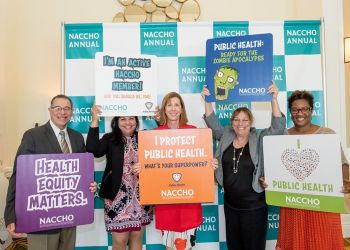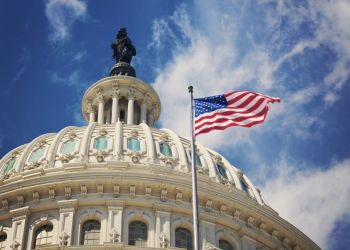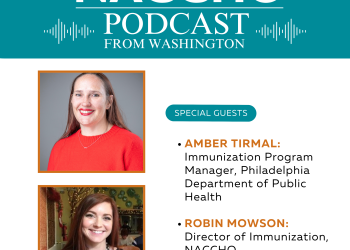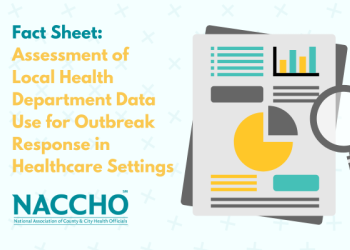WASHINGTON, DC, April 4, 2023 — The National Association of County and City Health Officials (NACCHO), the voice of the country’s nearly 3,000 local health departments, with support from the Centers for Disease Control and Prevention (CDC), has announced new and additional awards to local health departments as part of the Partnering for Vaccine Equity Project. These funds will support participants to identify and address inequities in influenza and COVID-19 vaccination coverage among racial and ethnic minority adults.
Twelve local health departments have been selected to participate in the second cohort of the program. Participants are:
- Boston Public Health Commission, MA ($150,000)
- Broome County Health Department, NY ($75,000)
- City of Fitchburg Health Department, MA ($150,000)
- District of Columbia Department of Health, DC ($75,000)
- Greene County Health Department, IL ($150,000)
- Jefferson County Public Health, WA ($150,000)
- Linn County Public Health, IA ($150,000)
- Northeast Texas Public Health District, TX ($150,000)
- Pottawattamie County Division of Public Health, IA ($150,000)
- Tacoma-Pierce County Health Department, WA ($150,000)
- The Emergency Health Services Federation, PA ($150,000)
- Warren City Health District, OH ($75,000)
Seven local health departments from the first cohort of this project were each awarded an additional $25,000. The award will support efforts to continue developing and implementing strategies to advance vaccine equity among racial and ethnic populations. Participants are:
- Central District Health Department, NE ($25,000)
- Dent County Health Center, MO ($25,000)
- Hall County Board of Health, GA ($25,000)
- Monongalia County Health Department, WV ($25,000)
- Paris-Lamar County Health District, TX ($25,000)
- Trumbull County Combined Health District, OH ($25,000)
- Two Rivers Public Health Department, NE ($25,000)
The Partnering for Vaccine Equity Project aims to increase local health departments’ capacity to address inequities in COVID-19 and influenza (flu) vaccination coverage among racial and ethnic minority adults. This work will be achieved by collaborating with local health departments to identify and address barriers to vaccines and engage community stakeholders and influential messengers to support vaccine messaging. Additionally, the project will provide education and vaccine delivery to the community level, facilitating relationships between vaccine providers and communities, to increase vaccine confidence, access, and uptake opportunities.
The CDC states:
- Over the past three flu seasons, vaccination coverage has increased among adults; however, racial, and ethnic disparities in flu vaccination coverage remain.
- Adults from racial and ethnic minority groups have lower flu vaccination rates and higher rates of severe flu illness and flu-related morbidity and mortality, than compared to non-Hispanic White adults. This same trend, of low vaccination and high morbidity and mortality, is documented for COVID-19.
Disparities in vaccination coverage, especially among racial and ethnic minority adults, contribute to and further exacerbate existing health inequities. Addressing inequities in COVID-19 and influenza (flu) vaccination coverage among racial and ethnic minority adults remains a priority which is the focal point of the Partnering for Vaccine Equity project. Through this project, NACCHO seeks to support local health departments to improve COVID-19 and influenza vaccination coverage. This project plays a vital role in improving the overall health and economic opportunities for historically marginalized groups and advancing health equity in communities. The project will conclude on July 31, 2023.
To learn more about the NACCHO Immunization portfolio, please visit our webpage here.
###
About NACCHO
The National Association of County and City Health Officials (NACCHO) represents the nation’s nearly 3,000 local governmental health departments. These city, county, metropolitan, district, and tribal departments work every day to protect and promote health and well-being for all people in their communities. For more information about NACCHO, please visit www.naccho.org.





